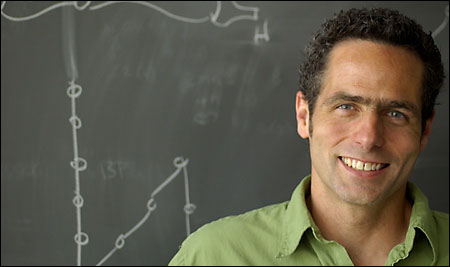Michael Hopkins, algebraic topologist
‘Deep and broad mathematician’ joins FAS

Michael J. Hopkins, whose work linking algebraic topology to other branches of mathematics and physics has earned him a reputation as the world’s pre-eminent algebraic topologist, has been appointed professor of mathematics in Harvard University’s Faculty of Arts and Sciences, effective July 1.
Hopkins, 47, comes to Harvard from the Massachusetts Institute of Technology (M.I.T.), where he has been on the mathematics faculty since 1989.
“Professor Hopkins is a very deep and broad mathematician, teeming with ideas and insights,” says William C. Kirby, Edith and Benjamin Geisinger Professor of History and Dean of the Faculty of Arts and Sciences. “He is not only the world leader in algebraic topology, but also an energetic and outgoing colleague. Both at M.I.T. and at Harvard, where he spent last year on sabbatical, he is regarded as an inspiring teacher and mentor.”
Hopkins has been a major player in recent developments linking algebraic topology to issues in number theory, such as elliptic curves and modular forms, and contemporary physics, such as string theory. His work has also brought homotopy theory – specifically, understanding of the homotopy groups of spheres, one of the central problems in topology – into closer contact with other fields of mathematics.
A central field in modern mathematics, algebraic topology solves topological, or geometrical, problems by translating them into algebra. Modern algebraic topology uses tools from abstract algebra – the study of algebraic structures such as groups, rings, and fields – to study these global properties of spaces.
Algebraic topology attempts to differentiate between multidimensional shapes, or topological spaces. Topological spaces are structures that can be continuously changed; for instance, the sides and corners of a triangle can be “pushed” and “pulled” to yield a circle or square. Topological spaces may serve to unify virtually every branch of modern mathematics, much as physicists seek a “grand theory” to unify all known observations and theories about the physical universe.
Born in Alexandria, Va., Hopkins received a B.A. in mathematics from Northwestern University in 1979, a Ph.D. in mathematics from Northwestern in 1984, and a D.Phil. in mathematics from the University of Oxford in 1984. He has taught at Lehigh University as a visiting lecturer in 1983, Princeton University as a postdoctoral fellow, instructor and assistant professor from 1984 to 1987, and the University of Chicago as a professor from 1988 to 1989. He joined M.I.T. as an associate professor in 1989, and was named a full professor in 1990.
Hopkins was a Rhodes Scholar from 1979 to 1982, and has earned other significant honors including the Presidential Young Investigator Award from 1987 to 1995, an Alfred P. Sloan Fellowship from 1987 to 1992, and the Oswald Veblen Prize in Geometry in 2001. He is a member of the American Academy of Arts and Sciences and the Royal Danish Academy of Sciences and Letters.
Hopkins is currently managing editor of the journal Advances in Mathematics and on the editorial board of the Journal of the Institute of Mathematics of Jussieu, and has also served as an editor for the Duke Mathematics Journal, Journal of the American Mathematics Society, Annals of Mathematics, Quarterly Journal of Mathematics, and K-theory.




